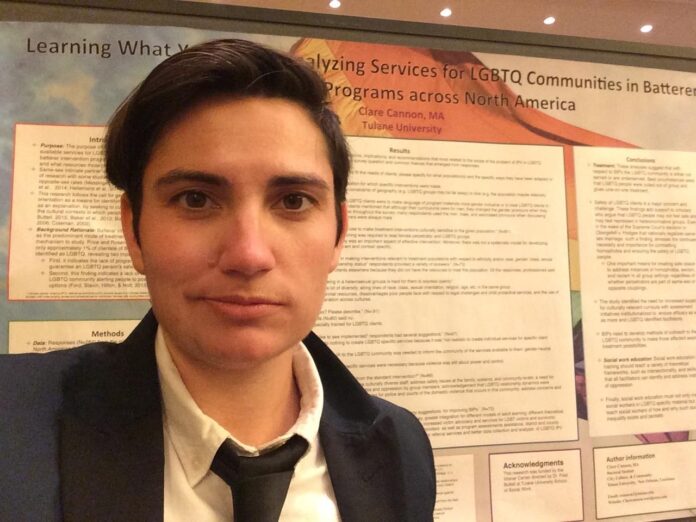In an effort to showcase the work of UC Davis’ researchers, The California Aggie will be starting a series featuring women who have been contributing to a better understanding of COVID-19
When we hear the words ‘COVID-19 research,’ vaccine development and antibody testing are often the first thoughts to pop up in our minds. Yet, with everyone stuck at home with limited opportunities for social interaction, it is also important to consider the social factors affecting people’s psychological health during this ongoing pandemic.
Assistant Professor in the Department of Human Ecology Clare Cannon brings these issues to light through her recent research paper examining how people’s differing socio-demographic characteristics and perceived stress correlated with their resilience. In this paper, resiliency is defined as an individual’s ability to cope with risk, adversity and stress despite exposure to a serious stressor that could contribute to physical, behavioral, cognitive and emotional symptoms.
Having been working in disaster resilience for two decades, Regardt Ferreira, associate professor and director of the Disaster Resilience Leadership Academy, explained that it is important to identify predictors that increase resilience in order to better assist disaster recovery.
“We all have resilience in us, often we just need to be reminded what those resilience traits are,” Ferreira said via email. “Looking out for one another is important, and providing social support is so important.”
When Cannon and her colleagues surveyed people in April during the first spike in U.S. cases of COVID-19, they found those with a degree in higher education or those who were older did better on the resilience tests. Alternatively, those who reported English as a second language did more poorly. In terms of perceived stress, those with a higher perceived stress were found to have less resilience.
Cannon noted that since their surveyed sample was skewed towards females and those with higher education, there is the possibility that people who are unemployed or may not have had the opportunity for higher education could be doing worse than they measured.
“One of the things we measured was the number of days in lockdown, and at that point the average was 28 days,” Cannon said. “Now we’re up to like 160, 170 [days], and so we really expect that even in this group [that] is kind of insulated because of their socioeconomic status [and] educational attainment—[they] are probably still going to be pretty bad off if we did [the test] again.”
As a social and environmental inequality researcher, Cannon and her colleagues chose to research resilience in order to determine how people can be better supported throughout the COVID-19 crisis. They have also been studying intimate partner violence for many years, and with rates spiking as the pandemic has progressed, they began to research how social isolation affected intimate partner violence to inform those making policies and help those suffering from abuse.
Fred Buttell, professor at the Tulane School of Social Work, added that it is important to recognize that measures used to protect public health can also have negative mental health consequences.
“COVID-19 is so personal,” Cannon said. “There’s no one who’s not affected in some way by it, and I think as a researcher and as an educator and as a scholar, I have a certain set of tools. And so it’s kind of my way of trying to do something good with this really awful, devastating situation.”
After devoting herself to religious and American studies during her undergraduate career at Scripps College, Cannon’s mentor suggested attending divinity school to continue exploring philosophy and religious studies. She attended Union Theological Seminary at Columbia University, where the school’s strong history of social justice inspired her to continue in the field. Although she had originally planned on going to medical school, she decided to pursue a PhD, and later become a professor.
“I think things happen at certain moments and junctures in our lives,” Cannon said. “And I think, for the most part, there’s no value judgement associated with that. There’s no right or wrong answer. It’s just, as your life unfolds, the choice and decisions we make, and the people we come into contact and the effects they had on our lives, I think can be really transformative.”
It was through her PhD program at the City, Culture and Community program at Tulane University that she met Buttell and Ferreria, co-authors of this study.
“I really admire her brain and her ability to think critically,” Buttell said of Cannon via email. “I think Davis is lucky to have her. She is the future of intimate partner violence research and that means that Davis will have one of the foremost experts on their faculty.”
Cannon advised conflicted undergraduate students to follow their hearts and intuition. She suggested those pursuing research get as much experience as they can, even if it does not directly relate to their interests, as any experience will help students discern their goals. As someone with a lot of passions, she empathizes with students’ struggle to determine which one of their interests they should pursue.
“Particularly for a lot of us, the world spends a lot of it’s time telling us that what we feel [and] what we think is wrong,” Cannon said. “I would say what you feel what you think is not wrong, and to follow your intuition, which doesn’t mean that it’s going to be an easy path or there isn’t going to be conflict or sacrifice with that. In my experience, the courage and wisdom to follow one’s intuition leads them where they need to be more often than not.”
Written by: Michelle Wong — science@theaggie.org









